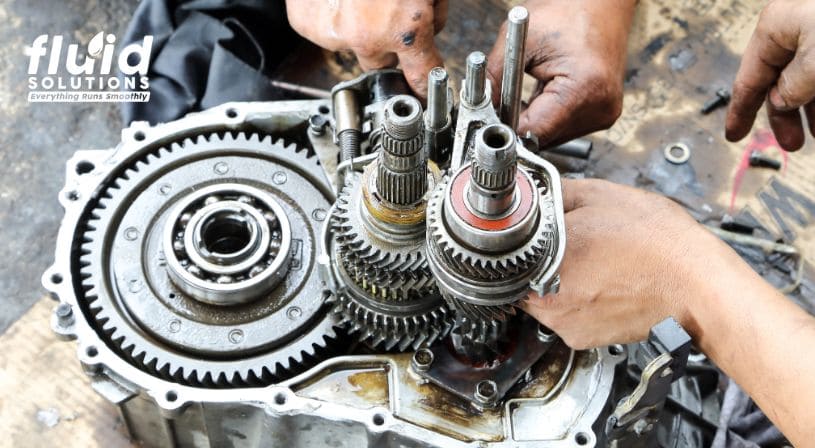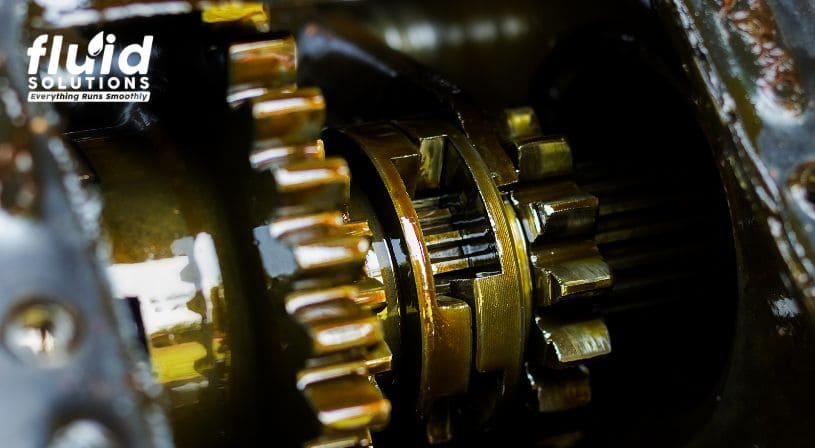
Image Source: https://www.vecteezy.com/photo/24314098-car-auto-gear-box-repair-fix
What are Gear Couplings?
Gear couplings are mechanical devices that connect two shafts, enabling the transmission of torque while accommodating misalignment. They comprise two hubs with external teeth that mesh with internal teeth on a sleeve, allowing for flexibility in alignment and movement. This design is beneficial in industrial machinery, where precise alignment is often challenging because of operational conditions.
Adequate lubrication is critical in gear coupling maintenance to keep these devices working properly. The right lubrication reduces friction between the gear teeth, minimizes wear, and enhances the coupling’s lifespan. Without proper lubrication, the gear teeth can experience increased friction, leading to higher temperatures and potential coupling failure.
Types of Gear Coupling Lubricants
Grease-Based Lubricants
Grease is the most used lubricant for gear couplings because of its ability to stay in place and provide effective lubrication over extended periods. Grease-based lubricants have a thick consistency, which helps maintain a lubricating film between the gear teeth even under high centrifugal forces.
They are especially beneficial in situations where regular re-lubrication is not workable. However, it is crucial to select a grease specifically designed for gear couplings, as general-purpose greases may not provide adequate protection.
Oil-Based Lubricants
Oil-based lubricants offer a different set of advantages, primarily because of their ability to flow and fill spaces more effectively than grease. They are less likely to dry out, making them suitable for high-speed applications. Compared with grease, industrial gear oil may require more frequent maintenance to ensure that the lubricant remains effective.
Synthetic Lubricants
Synthetic lubricants are engineered to provide superior performance in extreme conditions, such as high temperatures or heavy loads. They also offer better thermal stability and lower volatility compared to conventional lubricants.
In environments where industrial couplings operate at elevated temperatures, synthetic lubricants are preferred because of their superior thermal stability. Synthetic lubricants also work better for gear couplings subjected to high torque and heavy loads, as they provide enhanced protection against wear.
Overall, synthetic lubricants are often preferable in applications where mineral-based lubricants may be inadequate, especially in high-speed or high-temperature environments.
Factors to Consider When Choosing Gear Coupling Lubricants

Operating Conditions
When selecting a lubricant, consider the operating conditions, like temperature, load, and speed. High temperatures can degrade certain lubricants faster, while heavy loads may require more robust formulations to prevent breakdown.
- High Temperatures: In applications where gear couplings are exposed to high temperatures, synthetic lubricants are often preferred because of their superior thermal stability.
- Low Temperatures: Lubricants must keep fluidity in cold temperatures to ensure proper lubrication upon startup. Some synthetic lubricants are formulated to remain effective at temperatures as low as -60°C, making them suitable for these conditions.
- Light Loads: Lubricants should minimize frictional torque in light loads while providing adequate protection against metal-to-metal contact, so a lower viscosity lubricant is required.
- Heavy Load: Heavily loaded applications need lubricants with specific additives and high viscosity to protect against wear, pitting, and galling under increased pressures.
- High-Speed: Gear couplings operating at high speeds need lubricants with viscosity that remain effective under dynamic conditions.
- Low-Speed: Low-speed applications need lubricants with high viscosity that can provide a protective layer that can withstand lower shear rates.
Compatibility with Materials
When selecting a gear coupling lubricant, it is crucial to ensure compatibility between the lubricant and the materials used in the coupling assembly. Incompatibility can lead to several issues:
- Corrosion of yellow metals like bronze and brass because of acidic lubricant
- Swelling or softening of elastomeric seals and gaskets caused by certain lubricant base oils
- Degradation of the lubricant itself because of chemical reactions with coupling materials
To avoid these problems, choose a lubricant that is compatible with the specific materials used in the coupling, such as steel, bronze, and elastomers. Thus, it is essential to consult manufacturer specifications to select a lubricant that is compatible with the materials used in the gear coupling.
Maintenance Intervals
The quality and performance of the lubricant directly impact the maintenance intervals for gear couplings. Using a high-quality lubricant with the right additives can help extend maintenance intervals:
- Oxidation stability prevents the lubricant from breaking down prematurely, allowing for longer service life.
- Wear protection ensures the coupling components maintain their integrity for an extended period.
- Corrosion inhibition prevents damage to the coupling materials, reducing the need for frequent inspections and maintenance.
High-quality lubricants can extend the time between required maintenance, while poor-quality options may cause more frequent checks and replacements. Regular monitoring and proper lubricant selection can significantly enhance the reliability of gear couplings and reduce overall maintenance costs.
Conclusion
Selecting the right gear coupling lubricants determines the efficiency and longevity of industrial machinery. Proper lubrication practices enhance performance and reduce downtime and maintenance costs. By understanding the different lubricants available and considering factors such as operating conditions, material compatibility, and maintenance intervals, operators can make informed decisions that lead to better machinery reliability and performance.
Ensure Longevity and Efficiency—Select Fluid Solutions for Your Lubricant Needs!
Being one of the trusted industrial lubricant distributors in the Philippines, Fluid Solutions offers a range of high-performance lubricants, including gear coupling lubricants and greases, designed for a wide range of applications. Contact us through the website to find the perfect lubricant for your specific needs and enhance your equipment’s reliability. Gear coupling lubricants and greases, designed for a wide range of applications. Contact us through the website to find the perfect lubricant for your specific needs and enhance your equipment’s reliability.
You may also reach Fluid Solutions by calling (02) 8370 5928 / (0917) 894 9156. Alternatively, you may also email your concerns to inquiry@fluidsolutions.com.ph.
Social Media Links:
Facebook Page: https://www.facebook.com/fluidsolutionsinc
LinkedIn: https://www.linkedin.com/company/fluid-solutions-inc


